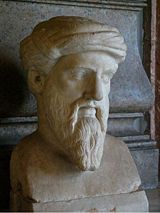Since food, used properly and regularly, greatly contributes to the best discipline, it may be interesting to consider Pythagoras's precepts on the subject. Forbidden was generally all food causing flatulence or indigestion, while he recommended the contrary kind of food, that preserve and are astringent. Wherefore he recommended the nutritious qualities of millet. Rejected was all food foreign to the Gods, as withdrawing us from communion with them. On the other hand, he forbade to his disciples all food that was sacred, as too honorable to subserve common utility. He exhorted his disciples to abstain from such things as were an impediment to prophecy or to the purity and chastity to the soul, or to the habit of temperance, and virtue. Lastly, he rejected all things that were an impediment to sanctity and disturbed or obscured the other purities of the soul, and the phantasms which occur in sleep. Such were the general regulations about food.
Specially, however, the most contemplative of the philosophers, who had arrived at the summit of philosophic attainments, were forbidden superfluous, food such as wine, or unjustifiable food such as was animated; and not to sacrifice animals to the Gods, nor by any means to injure animals, but to observe most solicitous justice towards them. He himself lived after this manner, abstaining from animal food, and adoring altars undefiled with blood. He was likewise careful to prevent others from destroying animals of a nature kindred to ours, and rather corrected and instructed savage animals, than injured them as punishment. Further, he ordered abstaining from animal food even to politicians; for as they desired to act justly to the highest degree, they must certainly not injure any kindred animals. How indeed could they persuade others to act justly, if they themselves were detected in an insatiable avidity in devouring animals allied to us. These are conjoined to us by a fraternal alliance through the communion of life, and the same elements, and the commingling of these.
Eating of the flesh of certain animals was however permitted to those whose life was not entirely purified, philosophic and sacred; but even for these was appointed a definite time of abstinence. Besides, these were not to eat the heart, nor the brain, which entirely forbidden to all Pythagoreans. For these organs are predominant and as it were ladders and seats of wisdom and life. Food other than animal was by him also considered sacred, on account of the nature of divine reason. Thus his disciples were to abstain from mallows, because this plant is the first messenger and signal of the sympathy of celestial with terrestrial natures. Moreover, the fish melanurus was interdicted because sacred to the terrestrial gods. Likewise, the erythinus. Beans also on account of many causes also were interdicted, physical, psychic and sacred.
Many other similar precepts were enjoined in the attempt to lead men to virtue through their food.











No comments:
Post a Comment